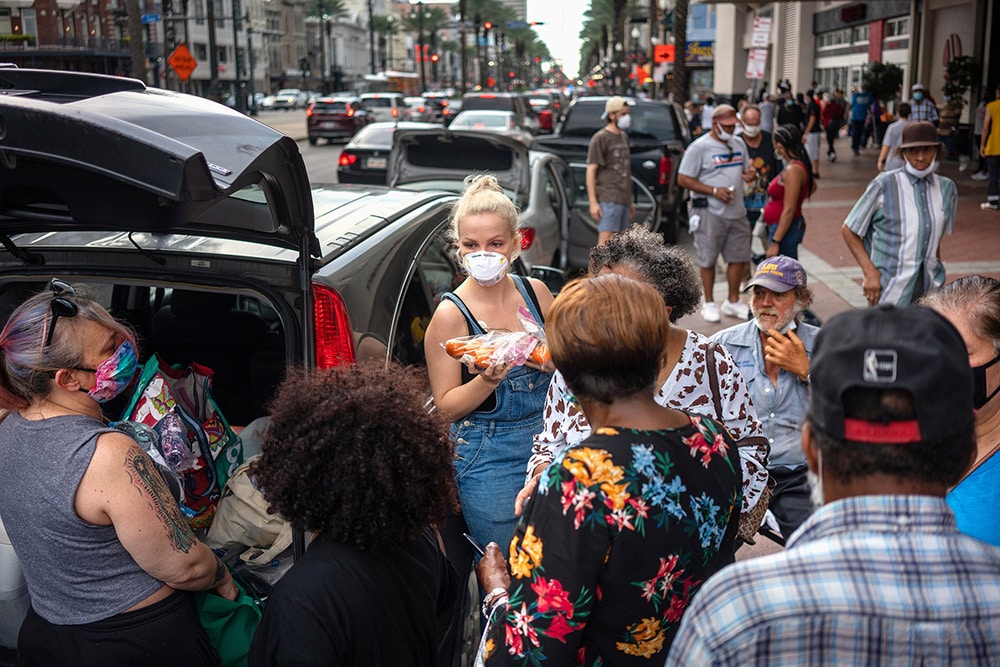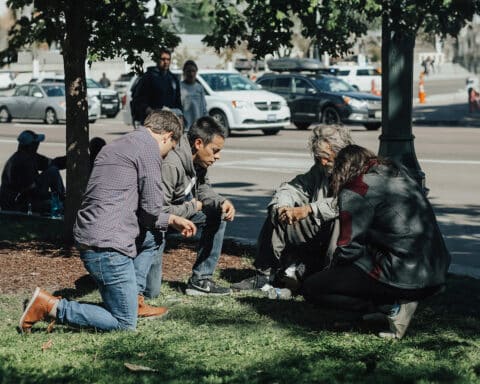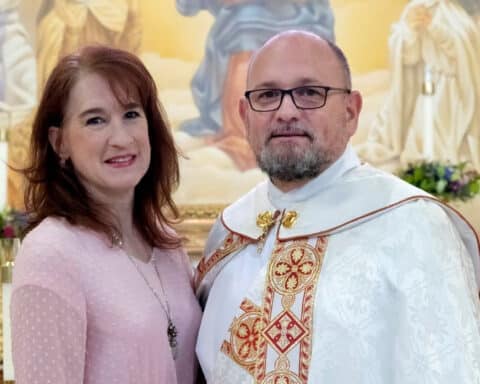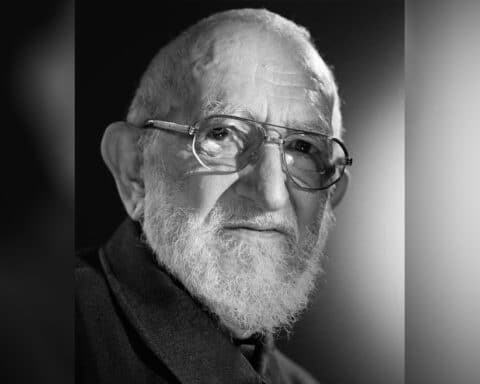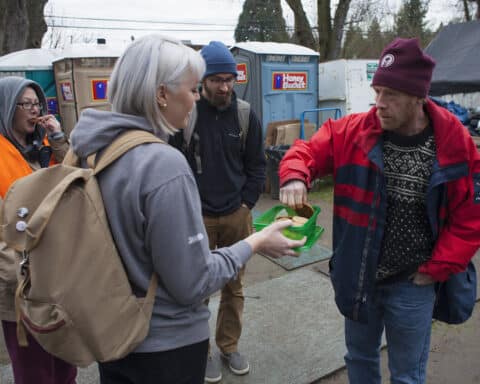Countless Americans were already at risk of homelessness this year because of job losses related to the COVID-19 pandemic. Natural disasters have further aggravated the precarious condition that many people find themselves in.
Our Sunday Visitor interviewed the directors of Catholic Charities in Washington state and Louisiana, which have been hit this year respectively by wildfires and a hurricane. They spoke about how people have been displaced amid the devastation, and how their agencies are helping even as the virus continues to pose a threat to everyone’s health and well-being.
Eastern Washington
Entire families and lone individuals walked through the smoldering ruins of Malden, Washington, looking through the ashes for any photographs and mementos that may have survived the inferno that destroyed their town on Labor Day.
“Most people in America will go their entire lives and never see a scene like this. That has an effect on the staff, too,” said Rob McCann, the president and CEO of Catholic Charities of Eastern Washington.
McCann saw firsthand the catastrophic damage that a fast-moving wildfire wreaked in Malden, a small town about 35 miles south of Spokane. In just 20 minutes, the fire destroyed more than 125 homes, the post office, city hall, the library and several businesses. About 80% of all the buildings in town burned to the ground, according to the local county sheriff’s office.
“The staff that came back (from Malden) told me they had never seen anything like it, that it looked like a bomb had gone off for as far as the eye could see. Everything was flattened and charred,” McCann told Our Sunday Visitor.
Dozens of wildfires — fueled by high winds and dry ground caused by little rainfall — have been burning this summer and fall on the West Coast. The fires have spread through eastern Washington, damaging property, engulfing structures and causing mass evacuations.
“This wildfire season is probably the worst we’ve seen in close to a decade,” said McCann, who added that Catholic Charities of Eastern Washington dispatched response teams to Malden and elsewhere throughout the region to assist people who suddenly found themselves homeless.
The agency has helped place displaced residents in hotels and is working on securing temporary housing trailers from the Federal Emergency Management Agency. McCann said Catholic Charities is also helping with the long-term recovery, including working with people’s insurance carriers to rebuild their homes.
“We’ve been dealing with wildfires the last couple of years, just about every summer, so we’ve gotten pretty good at being responsive to them, getting a hold of people and making sure they have housing, clothing, food, money and gas for their cars,” McCann said.
However, the wildfires have compounded a homelessness problem that Catholic Charities was already working to alleviate in eastern Washington. McCann estimates between 3,000 to 4,000 families in the region are at risk of losing their homes when the federal moratorium on evictions expires at the end of this year.
“We’re bracing for a mass homelessness event, community-wide,” McCann said. “You have a bunch of landlords with a bunch of tenants who haven’t paid their rents since March, and they’re all gonna get evicted all at once, unfortunately. So we’ve been ramping up to get ready for that.”
Job losses related to the pandemic have caused thousands of people in eastern Washington to fall months behind in their rents. McCann said Catholic Charities has been helping clients to pay the back-rent while negotiating with landlords to avoid as many evictions as possible.
The pandemic’s economic impact also directly threatened Catholic Charities of Eastern Washington, which had to cancel its biggest annual fundraising gala earlier this year. But McCann said the community stepped up and donated twice as much as that gala usually collects when the agency held a virtual fundraiser. He added that Catholic Charities in Brooklyn, New York, and Catholic Charities USA donated tens of thousands of dollars to help provide direct assistance to people displaced by the wildfires.
Said McCann: “People have been very generous in the midst of the crisis. I think people realize there’s still inter-generational poverty and there are still people suffering. They want to help even in the midst of the pandemic, maybe even more so than in a normal year.”
Lake Charles, Louisiana
Sister of Mercy Miriam MacLean got electricity back at her residence on Sept. 23, a little more than three weeks after Hurricane Laura swept through Lake Charles, Louisiana.
“It’s hard to describe the devastation that’s down here,” said Sister Miriam, the director of Catholic Charities of Southwest Louisiana.
Sister Miriam told Our Sunday Visitor that the building across the street from Catholic Charities’ offices “literally crumbled.” Downed trees dot the urban landscape, as do homes with caved-in roofs and damaged utility poles.
“The (city) just looks destroyed getting off the highway,” Sister Miriam said. “Not a road was left untouched.”
The Category 4 hurricane made landfall in southwestern Louisiana on Aug. 27, tearing roofs off buildings, snapping trees like twigs and leaving a huge swatch of the region underwater. The hurricane is estimated to have caused between $8 and $12 billion in damages in southwestern Louisiana and southeastern Texas near the Gulf of Mexico. At least 29 people have died.
The storm displaced thousands of people in and around Lake Charles. Since Hurricane Laura, Sister Miriam said Catholic Charities of Southwest Louisiana has given out more than $32,000 in hotel vouchers and delivered at least 420 pallets of supplies to more than 20 sites throughout the region.
That the hurricane struck during the pandemic also did not help, especially with Louisiana having one of the highest per-capita rates of COVID-19 infection in the country. The pandemic has kept some volunteers away and complicated Catholic Charities’ food distribution efforts.
“I am very concerned about the needs of the homeless, especially homeless families,” Sister Miriam said. “I am not aware of concrete numbers at this time but am going to develop a plan to attempt to track our contacts with families who are homeless.”
Even before the hurricane, finding housing for the poor and homeless was already an issue in Lake Charles, Sister Miriam said.
“So the storm definitely makes it more difficult,” she said. “Many people are calling, wanting to come back to Lake Charles, but there is no place for them to come. This represents a substantial challenge.”
With electricity starting to return to the city, Sister Miriam said she hopes Catholic Charities will soon have a better sense of how many people are returning to Lake Charles. Sister Miriam estimated that only about 10% of the people in her low-income neighborhood are back home.
“There have always been very limited sheltering options in Lake Charles, which has always been a major gap in services, and which I imagine will serve to be a greater problem in this time when so many homes have been destroyed. I do wonder about the possibility of providing a means to fill this gap,” Sister Miriam said.
One potential avenue to meet that need, Sister Miriam said, could be a new shelter for homeless families.
“I would want it to be a low-barrier shelter, so that people who need help are able to have a place to stay,” Sister Miriam said. “Shelter is a basic need, so you want to make that as simple as possible for people.”
Whether that would entail a new construction or renovating an already-existing, probably-damaged, building would need to be worked out.
“Catholic Charities is definitely open to pursuing this if the doors open,” Sister Miriam said.
Brian Fraga is a contributing editor for Our Sunday Visitor.

